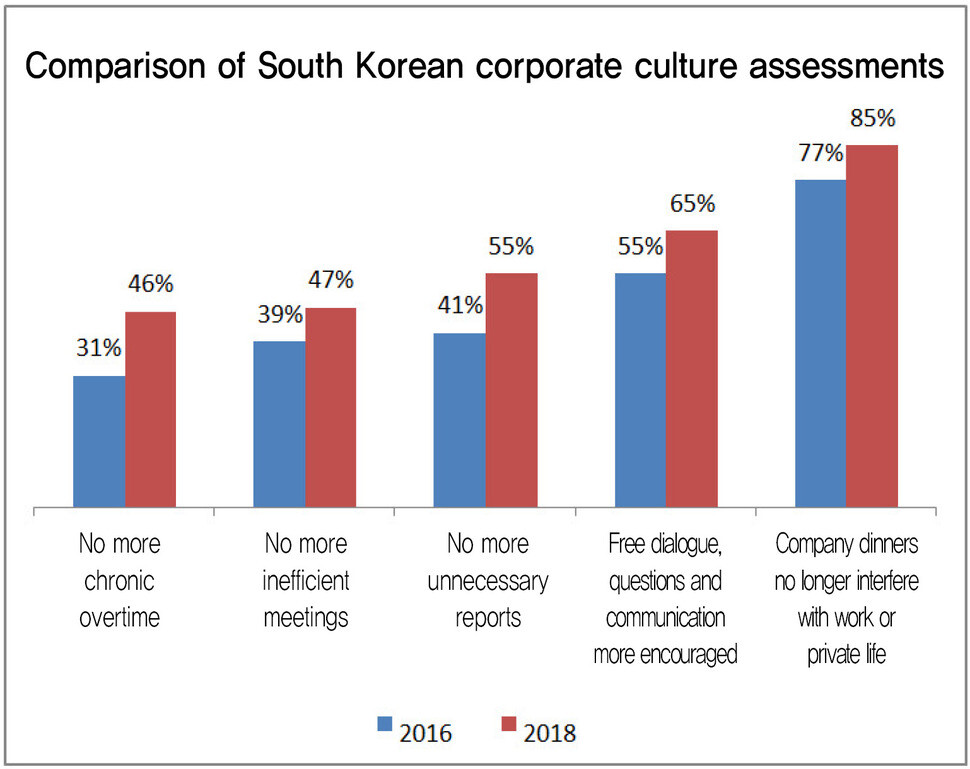hankyoreh
Links to other country sites 다른 나라 사이트 링크
Reforms of Korean corporate culture prove only superficial

“When they had the mandatory ‘lights out’ at the office [at the end of working hours], I worked under a desk light, and a ‘one-page’ report drafting campaign ended up with 30 to 40 pages of attached documents. The reforms are just cosmetic – nothing has changed.” (Deputy general manager at an affiliate with a chaebol boasting over 5 trillion won [US$4.7 billion] in assets)
“They allowed casual dress to ‘promote communication’ and abolished the use of titles to address people, but they don’t actually listen to opinions. It’s the same overbearing old men; they’re just wearing blue jeans.” (Assistant manager at a mid-sized company)
These were some of the findings in an assessment of South Korean corporate culture by the Korean Chamber of Commerce and Industry (KCCI) and the global consulting firm McKinsey & Company. On May 14, KCCI published a second diagnostic report on South Korean corporate culture and organizational health. The organization has been waging an oncoming campaign to improve “backward” practices in South Korean corporate culture, including the publication of its first report in 2016.
The findings of a corporate culture survey of around 2,000 employees at large corporations showed some improvements to backward practices mentioned in the first survey two years ago. The proportion reporting that they were “not chronically working overtime” rose from 31 percent to 46 percent, while the number reporting “no inefficient meetings” climbed from 39 percent to 47 percent. The percentage reporting “no unnecessary reports” jumped from 41 percent to 55 percent, and the number reporting “free dialogue, questions, and communication” increased from 55 percent to 65 percent.
But majority-positive responses remained below 60 percent. When asked whether they could “sense the improvements to corporate culture,” 87.8 percent gave negative responses: 59.8 percent agreed that “there have been some changes, but the culture cannot be seen as improved,” while 28 percent called the changes “merely for show” and said there was “no effect whatsoever.”
“Most of the assessments of corporate culture improvements consisted of phrases like ‘cosmetic reforms,’ ‘no enjoyment,’ ‘for show,’ ‘fossils in jeans,’ and ‘inefficient,’” noted KCCI.
“Corporate improvement activities have been skewed toward creating new systemic appearances, which has often led to fatigue and cynicism among staff members,” it concluded.
An analysis of organizational health for eight major companies yielded a median score of 55 for South Korean businesses, placing them far behind the 64 for around 1,800 global businesses analyzed by McKinsey.
“If those 1,800 global companies are divided into four equal categories of ‘high,’ ‘middle-high,’ ‘middle-low,’ and ‘low’ according to their organizational health, there were four South Korean companies in the ‘low’ group, three in the ‘middle-low’ group, one in the ‘middle-high’ group, and none in the ‘high’ group,” said Hwang Mi-jeong, a department director for KCCI’s corporate culture team.
“In terms of the nine assessment categories, South Korean companies ranked relatively high in ‘responsibility’ and ‘motivation,’ but lagged behind the global businesses in the five categories of ‘leadership,’ ‘external orientation,’ ‘coordination and control systems,’ ‘capacities,’ and ‘directionality,’” Hwang added.
As the three root causes of diminished corporate organizational health, KCII cited non-scientific working process, irrational performance management practices, and a lack of leadership capabilities. As four improvement tasks for fundamental reforms to corporate culture, it gave a faster work execution process, a light organization delegating powers and responsibilities, fostering talents with a focus on autonomy, and encouraging a “playing coach” style of leadership.
By Kwack Jung-soo, business correspondent
Please direct comments or questions to [english@hani.co.kr]

Editorial・opinion
![[Column] Park Geun-hye déjà vu in Yoon Suk-yeol [Column] Park Geun-hye déjà vu in Yoon Suk-yeol](https://flexible.img.hani.co.kr/flexible/normal/500/300/imgdb/original/2024/0424/651713945113788.jpg) [Column] Park Geun-hye déjà vu in Yoon Suk-yeol
[Column] Park Geun-hye déjà vu in Yoon Suk-yeol![[Editorial] New weight of N. Korea’s nuclear threats makes dialogue all the more urgent [Editorial] New weight of N. Korea’s nuclear threats makes dialogue all the more urgent](https://flexible.img.hani.co.kr/flexible/normal/500/300/imgdb/original/2024/0424/7317139454662664.jpg) [Editorial] New weight of N. Korea’s nuclear threats makes dialogue all the more urgent
[Editorial] New weight of N. Korea’s nuclear threats makes dialogue all the more urgent- [Guest essay] The real reason Korea’s new right wants to dub Rhee a founding father
- [Column] ‘Choson’: Is it time we start referring to N. Korea in its own terms?
- [Editorial] Japan’s rewriting of history with Korea has gone too far
- [Column] The president’s questionable capacity for dialogue
- [Column] Are chaebol firms just pizza pies for families to divvy up as they please?
- [Column] Has Korea, too, crossed the Rubicon on China?
- [Correspondent’s column] In Japan’s alliance with US, echoes of its past alliances with UK
- [Editorial] Does Yoon think the Korean public is wrong?
Most viewed articles
- 1‘We must say no’: Seoul defense chief on Korean, USFK involvement in hypothetical Taiwan crisis
- 2N. Korean delegation’s trip to Iran shows how Pyongyang is leveraging ties with Moscow
- 346% of cases of violence against women in Korea perpetrated by intimate partner, study finds
- 4Amnesty notes ‘erosion’ of freedom of expression in Korea in annual human rights report
- 5‘Weddingflation’ breaks the bank for Korean couples-to-be
- 6[Column] Park Geun-hye déjà vu in Yoon Suk-yeol
- 7Will NewJeans end up collateral damage in internal feud at K-pop juggernaut Hybe?
- 8Korea sees more deaths than births for 52nd consecutive month in February
- 9“Parental care contracts” increasingly common in South Korea
- 10[Interview] Dear Korean men, It’s OK to admit you’re not always strong